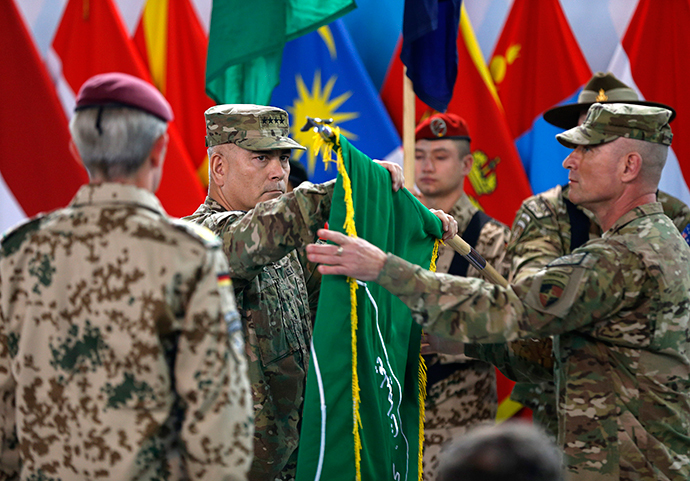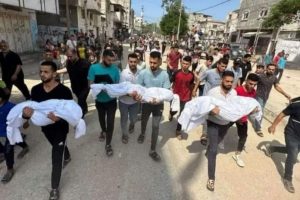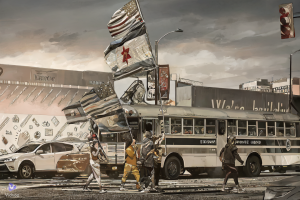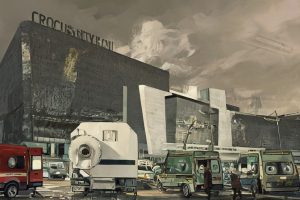US marks end of Afghan war and begins Support mission
KABUL (Afghanistan) — The U.S. led 13-year war in Afghanistan formally came to an end with a modest flag-lowering ceremony in Kabul that marked the transition of the combat operation to a support mission.
More than 3000 allied troops were killed during the war, including 41 Australians soldiers while 261 were wounded in the conflict.
The war has officially ended but some 400 Australian troops still remain in the country to provide training to Afghan government forces.
“Thanks to the extraordinary sacrifices of our men and women in uniform, our combat mission in Afghanistan is ending, and the longest war in American history is coming to a responsible conclusion,” U.S. President Barack Obama said.
The green-and-white flag of the ISAF was ceremonially rolled up and sheathed, and the flag of the new mission was hoisted, in a small ceremony at the headquarters of the North Atlantic Treaty Organization (NATO) mission.

Resolute Support mission
“Today marks an end of an era and the beginning of a new one. Resolute Support will serve as the bedrock of our enduring partnership with Afghanistan” said Resolute Support Commander, U.S. Army General John F. Campbell.
About 13,000 foreign troops, including 9,000 Americans and 400 Australians, will remain in the country under a new, two-year mission named “Resolute Support” that will provide training and support to Afghan security forces. 28 NATO Allies and 14 partner nations will contribute to the mission in different ways. At the operation’s peak, more than 130,000 troops from 50 nations were stationed across Afghanistan.
United States government deployed troops in Afghanistan weeks after the September 11, 2001 attacks while International Security Assistance Force in Afghanistan (ISAF) was set up after the U.S. invasion as an umbrella for the coalition of around 50 nations that provided troops and took responsibility for security across the country.
NATO Secretary General Jens Stoltenberg has said that Afghanistan’s 350,000-member security forces are ready to take on the insurgency alone, despite complaints by officials that they lack the necessary assets, such as air support, medical evacuation systems and intelligence.
“We need your help to build the systems necessary to ensure the long-term sustainability of our forces,” said Mohammad Hanif Atmar, Afghanistan’s National Security Advisor. “This is a formidable challenge for any modern army and police force.”
The international community continues to pledge support and financial commitment to help foster an Afghan Decade of Transformation which will be undertaken with the leadership of President Ashraf Ghani and Chief Executive Abdullah Abdullah.
“We are not walking away” Gen Campbell said describing the lingering challenges even after the end of war. “In spite of all of this, the insurgents continue to kill their fellow Muslims in their misguided cause. It’s time for the enemy to heed President Ghani’s call, lay down their arms, come to the peace table, and help rebuild the Afghan nation” he proposed. “The road before us remains challenging, but we will triumph,” Gen. Campbell concluded.
Mission Accomplished?
At the end of the 13-year long war, there is a general sense of regret as a total of 3,485 allied troops died, including 2,356 Americans, in Afghanistan war that has cost the U.S. $1 trillion since 2001. An estimated 21,000 Afghan civilians have been killed during the conflict, including nearly 3,200 in 2014.
As foreign troops make their way home, experts highlight the fragile security situation of the country and uncertainty over the country’s future amid fears of rising insurgency.
Meanwhile Taliban spokesman Zabihullah Mujahid called the ISAF’s flag-lowering event a “defeat ceremony” and said the insurgents’ fight would continue. “Since the invasion in 2001 until now, these events have been aimed at changing public opinion, but we will fight until there is not one foreign soldier on Afghan soil and we have established an Islamic state,” he said.





